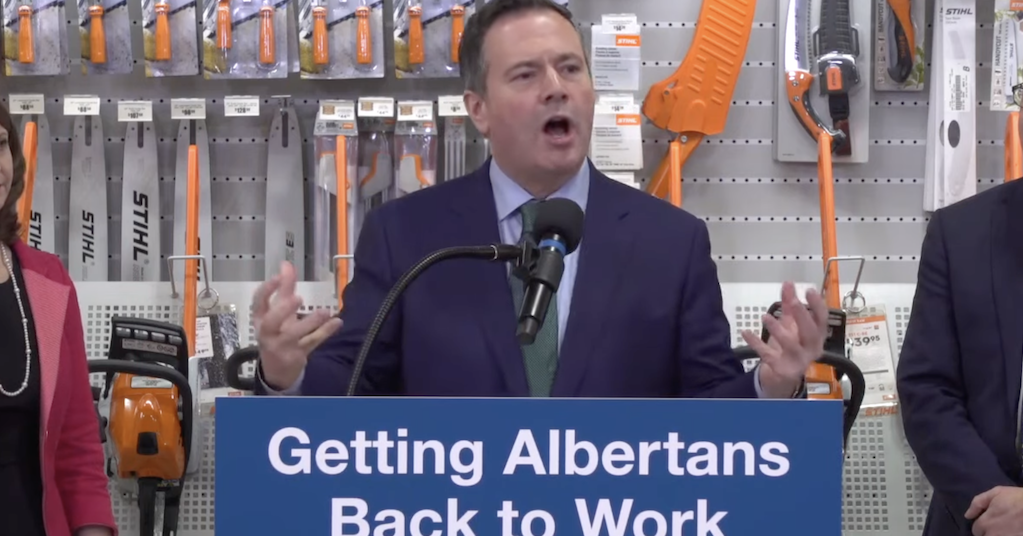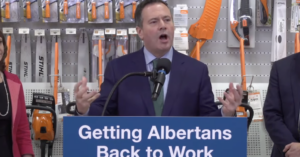
UCP Has Made Alberta’s Labour Laws the Worst in the Country, Experts Say
Alberta labour laws now even “worse than what we had under the PCs”
The United Conservative Party’s changes to Alberta’s labour laws are the worst in the country according to experts—even worse than the province’s previous Progressive Conservative governments.
“The UCP’s track record has been terrible for workers,” Athabasca University labour professor Bob Barnetson told PressProgress. “Things are worse than they were in 2015.”
Alberta already had the lowest unionization rates and the most regressive labour laws in the country, thanks to 80 years of right wing governments between 1935-2015, Barnetson notes.
However, between 2015-2019, the Alberta NDP conducted the province’s first major labour law overhaul in 30 years to bring Alberta’s labour codes in line with the rest of the country. These reforms included single step union certification, restoring public sector workers’ right to strike, increasing the minimum wage to $15, modernizing occupational health and safety laws, removing the cap on WCB earnings, improving overtime and leave provisions, creating labour protections for farm workers, among other changes.
While the NDP’s changes were intended to “modernize” Alberta’s labour regime, most reforms were quickly rolled back by the UCP.
“The UCPs changes to labour law included significant picketing restrictions that are worse than what we had under the PCs,” Barnetson explains.
The UCP’s Bill 32: Restoring Balance to Alberta’s Workplaces Act rendered strikes powerless by making it illegal for workers to prevent scabs from crossing a picket line. It also required unions to seek permission from the Alberta Labour Board for secondary picketing.
“Essentially, that renders legal picketing ineffective and it makes effective picketing illegal,” Barnetson said. “That is much worse than where we were before.”
“They are constraining picketing to the point where it isn’t an effective tool.”
“The UCP’s agenda has been to shift the wealth from workers to employers”
Bob Barnetson tackles the UCP government’s cheapening of labour in the May 2023 Feature Article, To the Breaking Point.
Illustrations by Gerry Rasmussen#alberta #abpoli #ableg #UCP #albertaviews pic.twitter.com/w0lGHWfiop
— Alberta Views (@albertaviews) May 2, 2023
The UCP also introduced the Public Sector Employers Act which allowed the government to set secret bargaining mandates for negotiations with public sector workers.
“You combine those two things, right? Secret mandates and really tightly constrained picketing rules and it becomes pretty hard, particularly for public sector workers, to bargain and strike to get a good deal,” Barnetson explains.
The UCP’s Bill 32 also made a “significant intervention” in internal union operations by forcing unions to divide their budgets into “core” and “non-core” activities, Barnetson notes.
Unions can collect automatic dues for “core” activities like collective bargaining and filing grievances, while funds for “non-core” activities like advocacy for better labour laws and charitable donations must be collected individually. Barnetson calls it a bureaucratic “nightmare.”
Constitutional lawyer Colin Feasby noted Bill 32’s financial restrictions is a prime example of legislation meant to “silence or impair the efficacy of political opponents.”
“That’s a significant intervention that we haven’t seen anywhere else in Canada that the UCP has done,” Barnetson adds. “The only time we’ve seen anything like that before was right at the end of the Harper regime.”
Stephen Harper’s federal Conservatives introduced stringent financial reporting for federal sector unions in 2012, but that legislation was quickly rolled back by the Liberal government in 2015 in response to protests from the labour movement.
The UCP’s Bill 32 also reintroduced two-step union certification and extended the timeline for unionization votes which gave employers more time to interfere with union drives.
The Alberta Federation of Labour has released a “Top Six” list of the most dangerous sections of Bill 32. #AbLeg #abpoli #canlab #DefendWorkerRights https://t.co/LJBjgEZOjl
— Alberta Federation of Labour (@ABFedLabour) July 24, 2020
The UCP’s Bill 47, introduced in the first year of the pandemic, also limited workers’ rights to refuse unsafe work.
The UCP also froze the minimum wage at $15 and introduced a youth minimum wage of $13 dollars for workers under 18.
Under the UCP, teachers pension plans were transferred to a company called AIMCO which had made repeated “risky” investments in companies with conservative ties. Barnetson says this doesn’t bode well for UCP leader Danielle Smith’s proposal to pull Alberta from the Canada Pension Plan.
“That is a pretty important thing, not just for workers, but also potentially for people who are already retired and collecting Canada Pension. Are their pensions in jeopardy if Smith wins?”
“As I get older, that’s a really important thing to me as a worker.”
Our journalism is powered by readers like you.
We’re an award-winning non-profit news organization that covers topics like social and economic inequality, big business and labour, and right-wing extremism.
Help us build so we can bring to light stories that don’t get the attention they deserve from Canada’s big corporate media outlets.
Become a member



